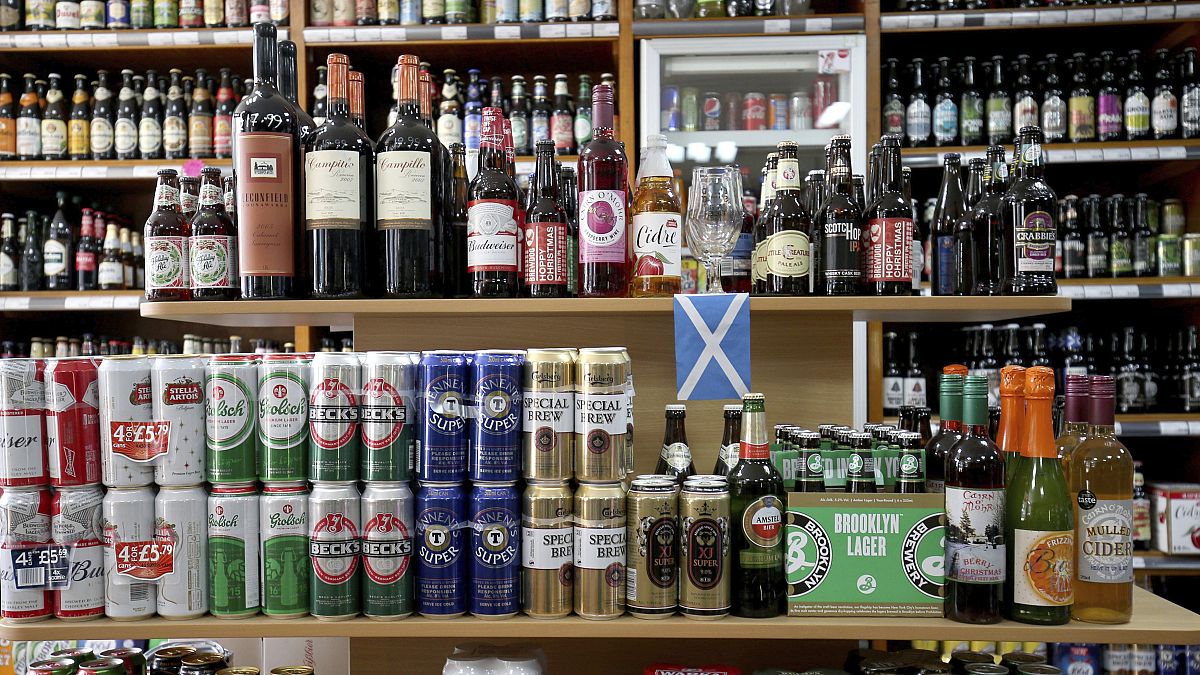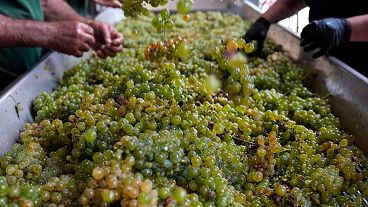A European-style deposit return scheme that would have created incentives for consumers to recycle bottles and cans will now be delivered years late.
When the Scottish Green Party joined the government in the Scottish Parliament in 2021, it seemed their time had truly come. The Scottish National Party (SNP), then led by Nicola Sturgeon, was keen to shore up Scotland’s brand as the most environmentally minded of the UK’s four nations, and the Greens arrived in office with ambitious ideas of their own to deliver.
Among these was an effort to crack down on the waste of drinks containers, including plastic and glass bottles, via what became known as the Deposit Return Scheme, or DRS.
On the face of it, the scheme’s basic proposed structure is simple: 20 pence (€0.23) would be added to the price of all bottles and cans, and then refunded to customers when they recycle their containers in participating shops or at “reverse vending machines” to be set up in various locations.
So far, so simple. The DRS is hardly a revolutionary idea, emulating similar initiatives that have been running in some other European countries for decades. Yet the proposal has turned into a political disaster, and thanks to a conflict with the government in Westminster, its implementation, originally planned for August and then set back to March 2024, has now been delayed till at least October 2025.
So where did it all go wrong?
Since it was first presented to the Scottish Parliament, the DRS has been vigorously criticised by the drinks industry – not just large corporate manufacturers but in particular small Scottish businesses, whose products make up a not insignificant share of the country’s exports and its national brand.
Much of the controversy hinged on the scheme’s complicated design, which would have required Scotland-specific machine-readable codes to be placed on containers by manufacturers and distributors in order for them to be returnable.
Retailers too were concerned about the financial implications of signing up to be return points for containers, and it was not clear how quickly the money refunded to customers would be remunerated to businesses by the government. In March, it emerged that they might have to wait as long as a full month, raising potentially existential cash flow problems.
Meanwhile, the entity created to oversee the DRS, Circularity Scotland, has been criticised for its lack of transparency. While it operates with government backing, as a private company, it is exempt from having to answer freedom of information requests.
The government’s pronouncements on the scheme’s supposed readiness failed to clear up the general confusion around what was being proposed and how it could work in practice.
Opposition members of the Scottish parliament and even some in the SNP have repeatedly grilled the Green's minister responsible for the scheme, Lorna Slater; she has strongly rejected criticism of the scheme while struggling to defend and explain it, both in parliament and in public.
So strong was the across-the-board resistance to the DRS’s rollout that during the long and acrimonious SNP leadership race earlier this year, all three candidates to succeed Sturgeon as first minister said it needed to be delayed and recalibrated.
The DRS’s rollout date was then pushed back from August to March so that problems could be ironed out before it began. But then came the latest and largest blow to the scheme yet.
Shattered
The DRS was designed to include glass bottles, which are already widely recycled in Scotland via standard on-street bottle banks. To go ahead on this basis, the Scottish Government would have required a full exemption from the terms of the UK Internal Market Act.
But ultimately, the Westminster government responded that by including glass in the scheme, Scotland’s scheme would diverge from the rest of the UK and thus risk compromising the “interoperability” of other return schemes planned for England, Northern Ireland and Wales – even though the Welsh scheme is currently set to include glass.
In its explanation for refusing to grant Scotland a full exclusion from the Internal Market Act, the government said the problem was the potential difficulty caused by "permanent divergence" between the four nations.
"This type of permanent divergence would be a very significant step for businesses and consumers," wrote, "and there is insufficient justification for such an approach. The inclusion of glass would add cost and complexity to the schemes in particular to hospitality and retail sectors, as well as adding consumer inconvenience."
The Scottish government is not impressed. First Minister Humza Yousaf told reporters that the decision amounted to “sabotage” by the UK government at the “eleventh hour”.
“They’ve made unreasonable demands that would’ve put Scottish business at a competitive disadvantage, and injects a whole level of uncertainty that we’re not prepared to allow…I’m afraid a separate Scottish scheme can’t go ahead, and we’re going to have to align with the UK scheme which will be October ‘25 at the earliest.”
Speaking in the Scottish Parliament, Lorna Slater also described the UK government’s requirements as “an act of sabotage”. Meanwhile reports have emerged that the Conservative Party received a £20,000 donation from an industry group lobbying against the inclusion of glass in the scheme.
Many opposition MSPs did not agree with the Scottish government's reaction. Instead, they are blaming the scheme's troubles on its complicated and sometimes confused design, which long ago alienated much of the public as well as industry.
And in the view of Labour’s Sarah Boyack, the debacle of the scheme is another example of Scotland suffering from “two bad governments” who are more interested in a constitutional row over devolution than in getting the basics of the policy right.
Whether or not Boyack’s criticism is fair, it is a fact that the DRS debacle is the latest in a string of events that have put severe strain on the relationship between the parliaments in Westminster and Holyrood.
The UK-wide government has refused to grant the nationalist-led Scottish parliament the power to legislate for another independence referendum, and the Scottish government lost a case at the UK Supreme Court last year in which it argued it should have that power.
More recently, the UK's Conservative government blocked a law passed by the Scottish parliament that would have altered the process by which people could legally change their gender.
In both cases, the pro-independence SNP and Greens have argued that the UK government is refusing to respect the democratic will of the Scottish electorate. In that far larger and more fraught battle, drinks container recycling is just the latest front line.



